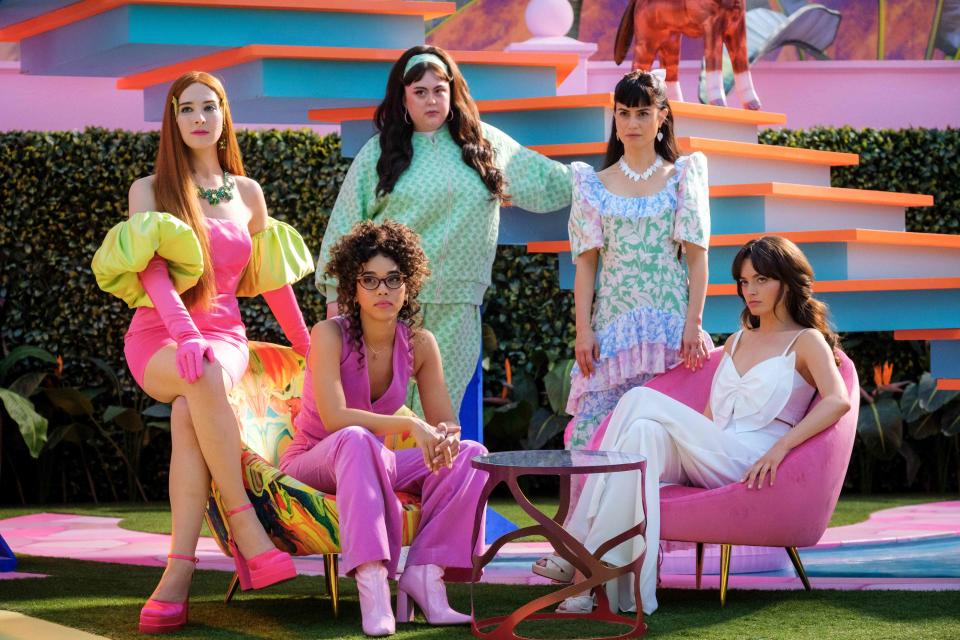Barbie's Feminism Doesn't Go Far Enough
One mom and her trans daughter discover that 'Barbie: The Movie' creates a very narrow definition of what it means to be female.

Courtesy of Warner Bros Pictures
Fact checked by Sarah Scott
Where I expected to leave Barbie: The Movie feeling pink and sparkly, I instead left feeling disappointed, particularly by its last line.
It’s meant as a joke, not to give any spoilers, but I instead found it exclusionary and limiting, especially for a movie so clearly reaching for inclusivity.
To me, it provided a very narrow definition of what it means to be female. So, as we left the theater, I asked my daughter, who was assigned male at birth, what she thought.
She liked including Hari Nef as Doctor Barbie, rather than making her “Trans Barbie” or otherwise defining the character through her gender. We watched another movie recently in which a trans character’s storyline focused almost entirely on gender identity. This felt limiting and overly simple, but it’s also a pretty common cinematic move: it checks the box of inclusion but eliminates a more complex or involved storyline.
Barbie managed to clear that hurdle, but other steps that would have added more inclusivity just weren’t addressed. My daughter wondered why the movie’s relationships remained so stringently cisgendered and heteronormative. Surely there was room for a queer Barbie or at least a non-stereotypical gay Ken, more than just Earring Magic Ken. After all, one of the cultural centerpieces of the movie is the Indigo Girls’ “Closer to Fine,” largely seen as a lesbian anthem for those of my generation.
My daughter is an older teen, so I considered that maybe she and I were just not the target audience. When I asked the 14-year-old trans daughter of a friend, she raved about the movie and how much she loved it.
Related: ‘Barbie’ Has a PG-13 Rating—Is It Appropriate for Younger Kids?
But she, too, wondered why there couldn’t have been a Barbie who was into another Barbie, maybe concluding the movie with a Barbie wedding. Based on my own completely unscientific and biased personal research, Barbie weddings provided a mainstay of imaginary play.
The point is, Barbie is all about possibility: the tagline when I was growing up was “We girls can do anything!”
In the 80s and 90s, as the line expanded to include different professions—though still highly limited in ethnicity or other differentiation—the dolls offered some progress toward viewing a more diverse future. It’s great that the movie included proudly out actor Kate McKinnon: visibility! Check!
Less great? She’s Weird Barbie, the one the others avoid as an outcast.
Our 14-year-old friend mentioned that she thought maybe any LGBTQ angle was downplayed for fear of political backlash. Practically, she also pointed out that controversy often brings with it a very tangible price: reduced box-office.
"I’m saddened that our daughters recognize that inclusion of their perspective within a movie meant to speak widely for the female experience is likely to provoke anger and, at minimum, decreased profit and limited future opportunities for other movies about women. I’m angered that there are those who are so determined to erase this narrative, I must worry about potential retaliation through bullying and even violence."
I’m saddened that our daughters recognize that inclusion of their perspective within a movie meant to speak widely for the female experience is likely to provoke anger and, at minimum, decreased profit and limited future opportunities for other movies about women. I’m angered that there are those who are so determined to erase this narrative, I must worry about potential retaliation through bullying and even violence.
When we left the theater, my daughter said she thought that the movie was meant to speak to die hard Barbie fans.
While she’s right, that group is vast and varied. As Matthew Huff, an associate entertainment editor at Parade magazine said, “For a movie that spends so much time dissecting gender norms and highlighting the importance of diversity, I really wish ‘Barbie’ had openly acknowledged queer people.”
Yes, of course these are dolls, not people. But part of the joy of playing with dolls is in enacting stories. The stories represented here, including the movie’s final joke, stick closely to a traditional narrative, doing little to offer genuine inclusiveness. Barbie fans are at least as different as Mattel’s creations claim to be, though, and fans—all of them—deserve to see stories that reflect a variety equal to their own.
Related: Here's Why I'm Proudly Raising a Barbie Girl
For more Parents news, make sure to sign up for our newsletter!
Read the original article on Parents.

